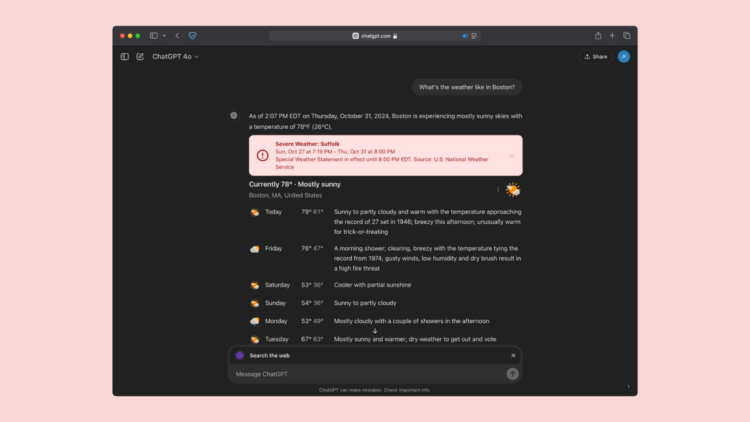[ad_1]
OpenAI has a Halloween announcement: ChatGPT search is now official. The company is finally rolling out an official competitor to AI search engines like Perplexity, Google’s AI Overviews, and Microsoft Bing (powered by Copilot).
OpenAI originally announced its search plans back in July, with a service called SearchGPT. While SearchGPT was a prototype, and launched with a waitlist to try it, ChatGPT search seems to have taken its place, with OpenAI rolling SearchGPT’s main features into its new search feature.
How ChatGPT search works
On the surface, ChatGPT search is very much a traditional search engine. To use it, you click on the globe icon when you launch ChatGPT (or hit the / key and click Search from the pop-up) then type your query. Let’s say you ask, “What’s the weather this weekend in New York City?” Hit enter, ChatGPT “thinks” for a moment, then spits out an answer to your question.
For this weather example, ChatGPT search actually has some dynamic graphics to go with its answer. OpenAI says it has partnered with different news and data providers for visual designs and updated information like this. That includes weather, but also queries regarding stocks, sports, news, and maps.

Credit: Jake Peterson
Whatever you search the web for, ChatGPT will cite its sources, like other AI-powered search engines. If you ask, for example, “What did Apple announce this week?” the bot summarizes the news, talking about new MacBook Pro models, a redesigned Mac mini, an updated iMac, Apple Intelligence’s release, and new upgrades to Apple accessories. For all these summaries, you can see the source it’s pulling from and click through the read the full article for yourself. You can also hover your cursor over these sources if you want to see a preview without opening the entire site.
In addition, at the bottom of the answer, there’s a general “Sources” option: Click this, and you can see a full list of the sources referenced for this summary, plus a longer list of search results for sources similar to your query—regardless of whether or not ChatGPT used them.
OpenAI says ChatGPT search is powered by a “fine-tuned” version of its GPT-4o model, and distills outputs from OpenAI’s o1-preview model. The company has also partnered with many news organizations across the industry, name-dropping companies like Condé Nast, Financial Times, Le Monde, The Atlantic, and Vox Media. To sell the point (and to get ahead of criticism, no doubt), the company included a number of quotes about how great its new search engine is from leaders of these media companies.
The company admits there’s currently room for improvement: While it has brought the “best” of SearchGPT’s tested features to ChatGPT search, shopping and travel search queries still need some time to bake. Search also is not yet available with Advanced Voice and canvas, but that’s coming.
ChatGPT search and privacy
According to OpenAI, when you search for something with ChatGPT’s new web search feature, ChatGPT may share “disassociated search queries” with other search providers, like Bing. The bot also scrapes your location information from your IP address, and can share it with these search providers for improving search result accuracy.
Who can use ChatGPT search?
Like most new ChatGPT features, search is not currently available for free and logged-out users. In order to try it today, you either need to be a ChatGPT Plus or ChatGPT Team user, or you need to have been a part of the SearchGPT waitlist.
The feature works on both desktop or mobile, but you can only preview sources without clicking through on the desktop web app.
How to set ChatGPT search as your default search engine
If you’re sick of Google, Bing, even Perplexity, and want to use ChatGPT as your default search engine going forward, you actually can. You’ll need to be using Chrome and download the ChatGPT search extension.
Now, when you type a query in your address bar, Chrome will open up ChatGPT. You’ll need to be logged into your eligible account, though. Otherwise, you’ll just get a result from the standard ChatGPT service, not search.
Is ChatGPT search accurate?
I reference Google’s AI Overviews a lot, not because it’s a reliable use of AI, but because it had such a disastrous rollout. While SearchGPT didn’t make any significant headlines for inaccuracy, it’s important to remember that generative AI is far from perfect. In fact, each result from ChatGPT, including search, ends with “ChatGPT can make mistakes. Check important info.”
That’s because AI can at times hallucinate, or, simply, makes things up that aren’t true. What certainly helps make fact-checking easier are the linked sources. If you want to double-check that a result is correct, click through the source to see if that site is both reflective of what ChatGPT says, and trustworthy in general. If ChatGPT says something, and cites AP News, and AP says it’s true, that’s pretty solid. If ChatGPT says something, and cites trustmebro.fr, exercise skepticism.
Time will tell whether ChatGPT search is more or less accurate than its competitors. Until then, if you do use ChatGPT search, or any of these AI-powered search engines, just be careful to check their results.
[ad_2]
Source link



No Comments
Leave Comment